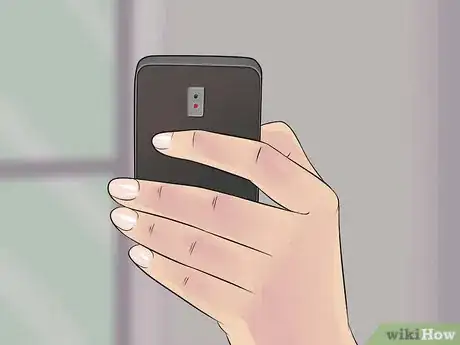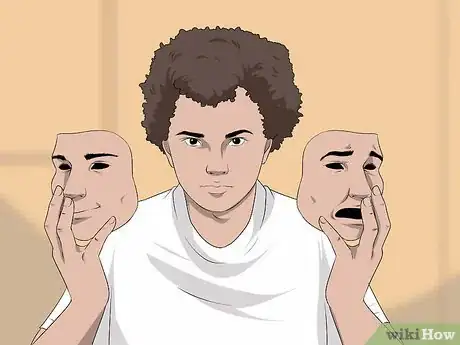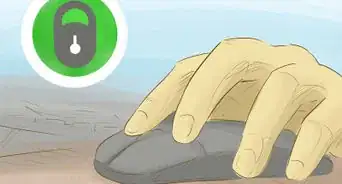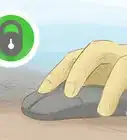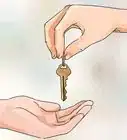This article was co-authored by Sarah Schewitz, PsyD. Sarah Schewitz, Psy.D. is a licensed clinical psychologist by the California Board of Psychology with over 10 years of experience. She received her Psy.D. from the Florida Institute of Technology in 2011. She is the founder of Couples Learn, an online psychology practice helping couples and individuals improve and change their patterns in love and relationships.
This article has been viewed 202,045 times.
Many people do not take stalking behaviors seriously, which can lead to potentially dangerous situations. A stalker is someone who pays attention to you in a way that would cause most people to feel fearful. Stalking is illegal and can be accompanied by behaviors related to harassment or intimidation. If you think you’re being stalked or have concerns about someone’s behavior toward you, take any indications or “gut feelings” seriously and report your concerns to a local authority. Pay attention to any strange behaviors and familiarize yourself with the traits and characteristics common to stalkers.
Steps
Noticing Strange Behaviors
-
1Notice an immediate and persistent need to contact you. A stalker may begin to immediately reach out to you and contact you incessantly. This person may begin to call, text, email and visit you to a degree that feels invasive to you. If the contact feels outside of social norms and exceeds your comfort level, the behavior may be related to stalking.
- Perhaps the person reaches out to you over several social media platforms and “friends” you, then begins to text you non-stop. You may begin to feel uncomfortable.
-
2Recognize someone who is clingy or keeping tabs on you. A person with stalker tendencies may insist you bring him or her to events, or to tag along to meetups with friends or family. The person may insist on knowing where you’re going or knowing your plans. You may begin to feel uneasy with someone always wanting to know your whereabouts or plans for the day.
- If someone insists on knowing what you do each day, this can be a red flag. There’s a difference between being interested in your life and becoming obsessed with your whereabouts.
- If you begin to date someone who shows these traits, reconsider seeing him or her again.
Advertisement -
3Be aware if they know more about you than you’ve told them. A stalker may have information about you that you have never provided. The person may research you and know information about you, your workplace, your friends, family members, and favorite places. They may know your route to and from work, what time you go to the gym, and any other patterns in your schedule.[1]
- You may notice that the person slips up and says something you never told them. This can be a warning sign.
-
4Identify social awkwardness. A stalker may not know the boundaries of acceptable social behavior. The person may be socially awkward, have little to no social awareness, and not “fit in” in groups.[2] The stalker may have little awareness as to how people interact with others or make assumptions for how others see them. Often, the person has no or few personal relationships and has low self-esteem.
- Some people are simply awkward, not stalkers. If the person doesn't seem to obsess over you, isn't threatening, and doesn't seem attached to you in particular, then they probably just aren't good at socializing.
-
5Consider how they respond to boundaries. Notice what happens if you politely set a boundary with them, such as "please don't talk to me when I'm working" or "please don't call after 9pm; I need this time to unwind alone." While regular people will respect this, a stalker will not. They may ignore your boundaries, try a different technique to invade your space (e.g. spying), or intimidate you so that you are afraid to set boundaries.
- Some socially awkward people, and people with developmental disabilities, have trouble reading body language. But, if you clearly ask them not to do something, they are capable of respecting that.
-
6Be alert to unannounced visits. Someone with stalking tendencies may drop in and visit you unannounced. This is troubling if you tell someone you have plans and the person shows up without telling you first. Pay attention to this warning sign that the person is not attending to your boundaries or respecting your privacy.[3]
- The person may act innocent enough, but pay attention to your own feelings. Do you feel uneasy or threatened, even just a little? Does the visit feel a bit aggressive or invasive to you?
- You might also notice that you bump into the person often when you are out. This may be because the person has memorized your schedule and knows where to find you throughout the day.
-
7Recognize physically aggressive behavior. A stalker may want to have you all to themselves. If you begin to distance yourself, the person may become increasingly aggressive and intimidating. Any thoughts of you leaving can cause severe distress to the person and trigger feelings of abandonment. The person may get physically aggressive. This person may follow you closely or stand near you as if to say, “you cannot get away from me, even if you try.”[4]
-
8Watch out for other serious behaviors. Stalking can take many forms. If you feel that the behavior someone if showing you may be considered stalking, then seek help from your local authorities. Some other serious behaviors that you should report immediately include:[5]
- Vandalizing your property.
- Sending things to you in the mail, such as pictures, letters, or other items.
- Driving by your house frequently.
- Making false police reports about you.
-
9Respond to the stalking. If you believe you are being stalked, take some action. If someone is familiar to you and begins to feel threatening, clearly communicate on no uncertain terms that you wish to be left alone. Limit your social media usage and increase your security everywhere: change your house locks, lock your windows, change your phone number, and adjust your daily patterns. Avoid going places alone and tell your friends, family, coworkers, and neighbors about your situation and ask for their help in keeping you safe.[6]
- Never confront your stalker alone. Always have someone - a friend, a family member, or an acquaintance - present with you. If necessary, alert the police.
Observing the Stalker’s Personal Traits
-
1Recognize delusions. Many stalkers suffer from delusions.[7] The delusions may be that you have something the person needs or wants, that you are this person’s one and only soulmate, or that you hold secrets that the person must know.
- The delusions may feed the stalking behavior, and the person will believe the delusions as true.
-
2Identify intensity. Most stalkers come off as very intense people. When you first meet a stalker, you may notice that they maintain intense and enduring eye contact. This may feel flattering at first but can begin to feel threatening. This person may believe that the two of you hold a very strong bond or are meant to be together.[8]
- This intensity may come out through a barrage of texts, frequent visits, or elaborate ways of getting your attention.
-
3Notice obsessiveness. A stalker may have obsessive tendencies. They may not take no for an answer, and may show behaviors or have thinking that is highly fixated. This obsessiveness can be very off-putting for others, yet the person lacks awareness of how the behavior affects others.
- The person may become so fixated in thoughts and behaviors that the stalking behavior becomes central to their life. For example, a stalker may become obsessed with seeing you every day, or knowing what you will do next.
-
4Pay attention to a need for control. Feeling in control feeds stalking behaviors. The more the person knows about you, the more they feel powerful or in control of or over you. Often, control is obtained by knowing as much information about you as possible. This is especially true regarding social media. A stalker may ask you about photos or events in very specific ways.[9]
- If someone asks you multiple times about the person you were with in a photo or about a specific location of a post, this can be a red flag.
-
5Be aware of grand gestures. Often, a stalker will believe that you are the only person they can love. This romanticism can quickly turn to obsession and stalking behavior. This person, who you are not romantically involved with, may seek you out or try to win you over by doing grand gestures to prove feelings of love.[10] This can include buying you expensive things, traveling far distances to see you, or lavishly proposing to you.
Identifying a Stalker
-
1Recognize common demographics. Some patterns have emerged regarding stalkers within the USA. Some things to look for include someone who is unemployed or underemployed, in the late 30’s to 40’s, and intelligent (often a high school and/or college graduate). Stalkers tend to be male but can also be female.[11]
- Substance abuse and personality disorders are common in people who stalk.
-
2Identify if it’s someone you know. Most often, people are stalked by someone they know. The most common stalker is an ex. This can be especially dangerous if the ex has a history of domestic violence. An ex may show up at your workplace and put you and other people in danger.[12] Someone you know may know what places you frequent and threaten you there.
- If you have an ex you think may be dangerous, alert workplace security and provide a photo of the person. You may want to alert your coworkers to any potential danger by saying, “A dangerous person is trying to reach me. Please do not let the door open for this person.”
- Some people stalk for revenge and may be an ex-coworker, vindictive relative, or scorned friend.
-
3Identify whether your stalker is a stranger. Being stalked by a stranger may be just as much a reason for concern as being stalked by someone you know, since it’s impossible to know the stranger's motives and whether the person is dangerous. Some common reasons a stranger may stalk you include if he or she lusts for you, agrees or disagrees with your political views, considers you a celebrity, or feels loved-scorned by you.[13]
- If you suspect you are being stalked by a stranger, report this concern to the police.
-
4Seek help to get rid of a stalker. If you are being stalked, then it is important for you to seek help as soon as possible. If not stopped, then stalking can escalate into a dangerous situation for you. Contact your local authorities as soon as possible to get help.[14]
- If you feel like you are in immediate danger, then call emergency services right away.
Expert Q&A
Did you know you can get expert answers for this article?
Unlock expert answers by supporting wikiHow
-
QuestionWhat do I do if my ex is following me?
 Sarah Schewitz, PsyDSarah Schewitz, Psy.D. is a licensed clinical psychologist by the California Board of Psychology with over 10 years of experience. She received her Psy.D. from the Florida Institute of Technology in 2011. She is the founder of Couples Learn, an online psychology practice helping couples and individuals improve and change their patterns in love and relationships.
Sarah Schewitz, PsyDSarah Schewitz, Psy.D. is a licensed clinical psychologist by the California Board of Psychology with over 10 years of experience. She received her Psy.D. from the Florida Institute of Technology in 2011. She is the founder of Couples Learn, an online psychology practice helping couples and individuals improve and change their patterns in love and relationships.
Licensed Psychologist
-
QuestionWhat are the signs of obsession?
 Trudi Griffin, LPC, MSTrudi Griffin is a Licensed Professional Counselor in Wisconsin specializing in Addictions and Mental Health. She provides therapy to people who struggle with addictions, mental health, and trauma in community health settings and private practice. She received her MS in Clinical Mental Health Counseling from Marquette University in 2011.
Trudi Griffin, LPC, MSTrudi Griffin is a Licensed Professional Counselor in Wisconsin specializing in Addictions and Mental Health. She provides therapy to people who struggle with addictions, mental health, and trauma in community health settings and private practice. She received her MS in Clinical Mental Health Counseling from Marquette University in 2011.
Professional Counselor
-
QuestionHow do you stop stalking?
 Trudi Griffin, LPC, MSTrudi Griffin is a Licensed Professional Counselor in Wisconsin specializing in Addictions and Mental Health. She provides therapy to people who struggle with addictions, mental health, and trauma in community health settings and private practice. She received her MS in Clinical Mental Health Counseling from Marquette University in 2011.
Trudi Griffin, LPC, MSTrudi Griffin is a Licensed Professional Counselor in Wisconsin specializing in Addictions and Mental Health. She provides therapy to people who struggle with addictions, mental health, and trauma in community health settings and private practice. She received her MS in Clinical Mental Health Counseling from Marquette University in 2011.
Professional Counselor
References
- ↑ https://www.eharmony.com/dating-advice/dating/signs-stalking-behavior/
- ↑ http://blogs.psychcentral.com/caregivers/2014/09/characteristics-of-the-stalker-know-what-to-look-for/
- ↑ https://www.eharmony.com/dating-advice/dating/signs-stalking-behavior/
- ↑ https://www.eharmony.com/dating-advice/dating/signs-stalking-behavior/
- ↑ https://tahoesafealliance.org/get-help/stalking/
- ↑ http://www.asecurelife.com/signs-of-a-stalker/
- ↑ http://blogs.psychcentral.com/caregivers/2014/09/characteristics-of-the-stalker-know-what-to-look-for/
- ↑ https://www.eharmony.com/dating-advice/dating/signs-stalking-behavior/
- ↑ https://www.eharmony.com/dating-advice/dating/signs-stalking-behavior/
- ↑ http://blogs.psychcentral.com/caregivers/2014/09/characteristics-of-the-stalker-know-what-to-look-for/
- ↑ https://www.psychologytoday.com/blog/machiavellians-gulling-the-rubes/201605/the-7-types-stalkers-and-how-spot-them
- ↑ https://www.psychologytoday.com/blog/machiavellians-gulling-the-rubes/201605/the-7-types-stalkers-and-how-spot-them
- ↑ https://www.psychologytoday.com/blog/machiavellians-gulling-the-rubes/201605/the-7-types-stalkers-and-how-spot-them
- ↑ Sarah Schewitz, PsyD. Licensed Psychologist. Expert Interview. 15 April 2019.
About This Article
To know if someone is stalking you, look for obsessive or controlling behaviors, as well as lack of respect for your boundaries. For example, they may constantly text you or ask to know exactly what you’re doing each day. Be wary of a person who knows more about you than you’ve told them, such as your route to work or when you go to the gym, since this may indicate they’re keeping tabs on you. You may also notice they develop obsessive tendencies, such as needing to see you every day, even though you'd ve told them to leave you alone. Remember that stalking can be intimidating and dangerous if you’re the target, so seek help from your local authorities if you spot somebody behaving like this towards you. For tips from our social co-author on how to confront a stalker, keep reading!








